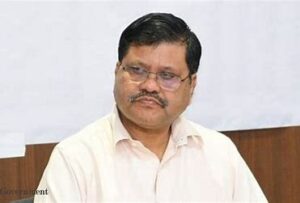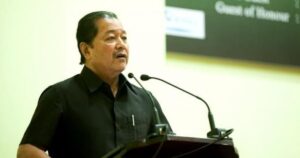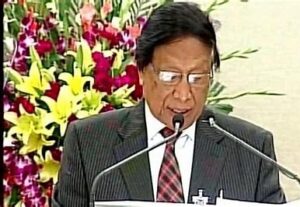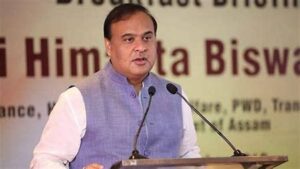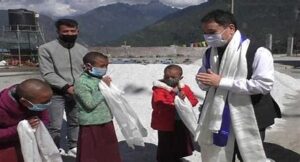In the dynamic political landscape of Meghalaya, one name that stands out for its unwavering dedication to social causes and the development of the state is Ranikor Lyngdoh. A well-respected politician and social worker, Lyngdoh has been instrumental in shaping the region’s political discourse while also making significant strides in improving the lives of the people, especially in rural areas. His journey through the intricate layers of Meghalaya’s politics and his active role in grassroots social initiatives highlight a legacy of both political acumen and humanitarian values.
This blog delves into the life, career, and contributions of Ranikor Lyngdoh, underscoring his influence on the political and social fabric of Meghalaya.
Early Life and Background
Born and raised in the heart of Meghalaya, Ranikor Lyngdoh’s roots run deep in the state’s cultural and political heritage. Hailing from a humble background, Lyngdoh’s early experiences were shaped by the socio-economic challenges faced by rural Meghalaya. His education in local schools provided him with a strong academic foundation, but it was the realities of life in the rural areas that left an indelible mark on his worldview.
As a young man, Lyngdoh was drawn to social work, motivated by the desire to improve the living conditions of his fellow citizens. His early exposure to the hardships of rural communities, particularly in the remote corners of Meghalaya, sparked a determination to make a difference. This was the beginning of his journey, one that would intertwine his destiny with the political and social development of the state.
Political Journey: From Grassroots to the Assembly
Ranikor Lyngdoh’s political journey began at the grassroots level, where he was actively involved in community mobilization and social welfare initiatives. His deep understanding of the local issues and his ability to connect with the people played a crucial role in his rise in Meghalaya’s political arena.
His first foray into mainstream politics came when he contested the 2018 Meghalaya Legislative Assembly elections. Representing the Ranikor constituency, he emerged as a strong candidate, backed by his extensive work in the region and his ability to connect with voters on a personal level. His political ideology centered around the welfare of rural communities, economic development, and ensuring that the voices of the marginalized were heard in the corridors of power.
Lyngdoh’s focus on rural development, education, and healthcare resonated with the electorate, allowing him to win a seat in the state assembly. His election was seen as a victory for the common people of Meghalaya, as Lyngdoh was seen as a politician who would truly represent their interests.
Contributions to Rural Development
As a legislator, Ranikor Lyngdoh has worked tirelessly to address the challenges faced by the rural population of Meghalaya. Rural areas often face the brunt of neglect when it comes to infrastructure, healthcare, and education. Recognizing this, Lyngdoh made it his mission to ensure that the needs of rural communities were met.
One of his most significant contributions has been in the area of rural healthcare. Lyngdoh advocated for better healthcare facilities in remote areas, ensuring that basic medical services were accessible to all. He pushed for the construction of healthcare centers and the recruitment of medical professionals in rural regions, addressing the issue of inadequate medical infrastructure that often left communities vulnerable to disease outbreaks.
In addition to healthcare, Ranikor Lyngdoh has been instrumental in improving the education system in rural Meghalaya. He pushed for the construction of schools and training centers in remote areas, ensuring that children had access to quality education. By fostering educational initiatives, he aimed to break the cycle of poverty and equip future generations with the skills needed to thrive in a rapidly changing world.
Moreover, his advocacy for better roads, electricity, and drinking water systems has had a profound impact on the living conditions of rural communities. By focusing on infrastructure development, Lyngdoh worked to ensure that rural Meghalaya was not left behind in the state’s overall growth.
Social Welfare Initiatives: Empowering Women and Youth
Ranikor Lyngdoh’s commitment to social causes extends beyond just infrastructure development. His work has had a lasting impact on women and youth empowerment in Meghalaya. In a state where women play a central role in the socio-economic structure, Lyngdoh recognized the importance of their active participation in governance and development.
Through his initiatives, Lyngdoh has worked to create more opportunities for women in various sectors. His efforts to promote women’s rights, economic independence, and political participation have made a significant difference in communities that were previously marginalized. By supporting women-led initiatives, he contributed to the broader goal of achieving gender equality in Meghalaya.
In the realm of youth empowerment, Lyngdoh has focused on creating educational and employment opportunities for the young population. Through skill development programs and vocational training, he has helped young people gain meaningful employment and contribute to the state’s economy. His belief in the potential of the youth has made him a popular figure among young voters, who see him as someone who champions their aspirations.
Advocacy for Indigenous Rights and Cultural Preservation
As a politician in Meghalaya, a state known for its rich indigenous culture and traditions, Ranikor Lyngdoh has also been a staunch advocate for the rights of indigenous communities. Meghalaya’s diverse indigenous population, consisting of various tribes, has long struggled to preserve its cultural heritage in the face of modernization and external influences.
Lyngdoh has consistently fought for the protection of the rights of indigenous people, ensuring that they retain control over their land, culture, and traditions. He has been an advocate for policies that protect the unique identity of Meghalaya’s indigenous communities, while also promoting economic development that respects and enhances their cultural values.
His work in advocating for indigenous rights goes hand-in-hand with his push for political autonomy and self-determination for the people of Meghalaya. Lyngdoh has voiced concerns over the challenges posed by migration and the dilution of indigenous cultures, stressing the need for a balance between progress and the preservation of cultural heritage.
Leadership in Times of Crisis
Like many leaders, Ranikor Lyngdoh has also shown resilience and leadership during times of crisis. Meghalaya, like many other parts of India, has faced challenges such as natural disasters, economic downturns, and health crises. During such times, Lyngdoh has played a pivotal role in coordinating relief efforts, ensuring that aid reached those most in need.
During the COVID-19 pandemic, Lyngdoh took swift action to ensure that the people of his constituency had access to necessary resources. From organizing relief camps to ensuring the timely distribution of essential supplies, he was at the forefront of managing the crisis. His leadership during such challenging times cemented his reputation as a politician who puts people’s needs above all else.
Looking Ahead: The Future of Meghalaya
As Ranikor Lyngdoh continues to serve his constituency and the state, his future in politics appears bright. His work in transforming rural Meghalaya, his focus on social welfare, and his advocacy for indigenous rights have laid a solid foundation for continued success. The people of Ranikor and the wider state of Meghalaya look to him as a leader who understands their struggles and works tirelessly to address their needs.
Looking ahead, Lyngdoh is expected to play a significant role in shaping the political future of Meghalaya. His ability to bridge the gap between traditional values and modern challenges will likely influence policy decisions in the years to come. Whether through continued advocacy for rural development or his commitment to social causes, Lyngdoh’s influence will undoubtedly remain strong in the region.
Conclusion
Ranikor Lyngdoh’s journey as a politician and social worker is a testament to the power of community-driven leadership. His unwavering commitment to rural development, social welfare, and the preservation of indigenous rights has made him one of Meghalaya’s most respected leaders. As he continues to champion the causes of his people, Lyngdoh’s legacy will undoubtedly leave a lasting impact on the state’s political and social landscape.
His story serves as an inspiration to aspiring leaders and social workers alike, proving that true leadership is rooted in service, empathy, and a deep commitment to one’s community. Through his efforts, Ranikor Lyngdoh has not only shaped the present of Meghalaya but also paved the way for a brighter, more inclusive future.
